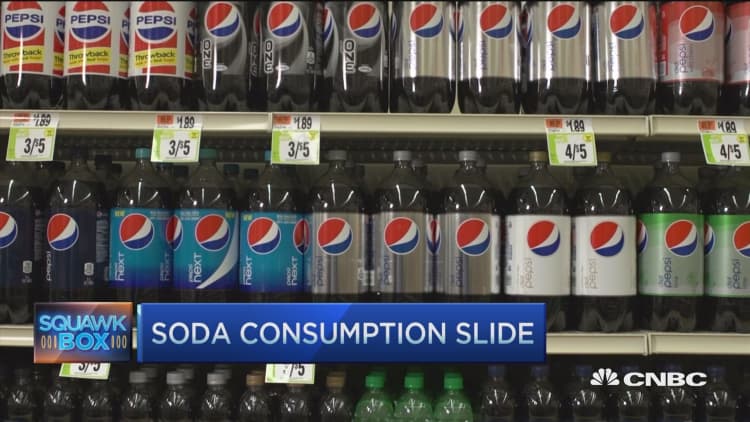Philadelphia's recent soda tax has led to a disastrous decline in soft-drink sales, according to the beverage industry.
According to sources, Philadelphia supermarkets have seen Coca-Cola sales volumes fall 30 percent to 50 percent. As a result, many are cutting shelf space for beverages like soft drinks, teas and juices by as much as 50 percent.
Rival PepsiCo has seen a 40 percent drop in beverage sales and only a 10 percent to 15 percent bump in sales just outside the city, leading to cuts of 80 to 100 jobs out of 423 in the area. That means the tax is generally not pushing consumers to purchase fizzy drinks outside Philadelphia.
Coca-Cola said it doesn't have any job cuts happening at this time; the company employs 700 in the metro area.
Those who do go outside the city to buy sweetened drinks, including diet beverages, haven't offset those who have stopped buying the drinks altogether.
The City of Brotherly Love's new soda tax has high stakes for the beverage industry, as other cities look to follow in Philadelphia's footsteps.
In June, Philadelphia's City Council approved a 1.5-cent-per-ounce distributor levy on soda, making it the first major city to tax the beverages. Companies and distributors have reacted by passing the increase on to consumers. For instance, consumers in Philadelphia must now shell out about an additional $1.01 on a 2-liter bottle of soda.

While the beverage companies are taking a beating, the mayor's office tells a different story.
The city raised $5.7 million in January, more than double the projected amount. It expects to bring in $91 million for the year, which would help fund community school programs, as well as infrastructure projects like libraries, parks and pre-K programs. These projects have created 240 jobs since January, and most of those jobs are full-time positions.
The city says the soda tax is a big success, even with soda companies reporting falling sales. City officials in Mayor Jim Kenney's office are skeptical of the job-loss claims at PepsiCo and elsewhere, but the city is working to verify them.
The story is bigger than Philadelphia. A much bigger market, Chicago's Cook County, has passed a similar tax that goes into effect in July. Boulder, Colorado, San Francisco, and others also voted on similar measures, despite heavy lobbying from the industry.
One to watch is Santa Fe, New Mexico, which has a hearing on the issue this week.
"The greater Philadelphia area accounts for ~2% of total U.S. volumes in measured channels," said Brett Cooper, a beverage analyst at Consumer Edge research.
"Whether it rains on Memorial Day can move volumes that much in a quarter. My perspective is that individual cities for the most part are manageable. If we start to get to states, there may be an issue. Coke weathered the sugar tax in Mexico and that's about 12 percent to 13 percent of Coke's volume. In my opinion, that would get to the breaking point on impact. Then a 5 percent to 10 percent move begins to impact trends."
CLARIFICATION: This story was updated to clarify that the 1.5-cent-per-ounce distributor tax on soda means consumers would have to pay about an additional $1.01 on a 2-liter bottle of soda when the cost of the distributor tax is passed along to consumers.


